One Million Sign Petition To Expel Iranian Envoys From G7 Countries
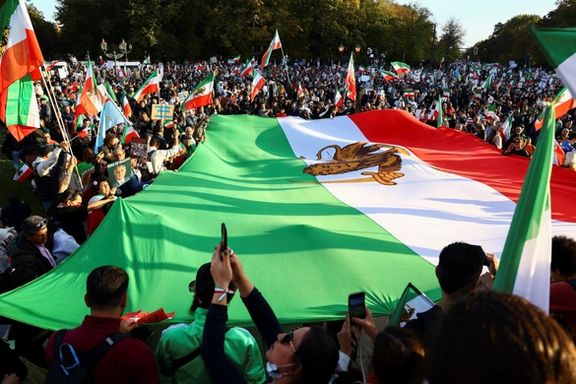
Nearly one million people have so far signed a petition to expel Iran’s ambassadors from the G7 countries in protest to the heavy crackdown on demonstrators.

Nearly one million people have so far signed a petition to expel Iran’s ambassadors from the G7 countries in protest to the heavy crackdown on demonstrators.
The campaign initiated by the founding members of “Iranians for Justice and Human Rights” called on the foreign ministers of the United Kingdom, Canada, the United States, Japan, Germany, France, and Italy to immediately designate the ambassadors or other representatives of the Islamic Republic in their countries.
The signatories urge G7 countries to designate the envoys personae non grata and order their expulsion in protest to the illegal and inhumane treatment of protesters in Iran.
The petition also calls on the countries to forcefully and unequivocally demand the release of all prisoners of conscience in Iran.
“The brutal crackdown and violence by …Islamic regime in Iran has resulted in countless deaths, injuries, and incarcerations. It is evident that the Islamic regime in Iran intends to continue and escalate the inhumane violence against its own citizens,” reads the petition.
Since the beginning of the protests after Mahsa Amini's death in the custody of ‘hijab police’, many young and under-age protesters have been apprehended and interrogated. Some were found dead after security forces arrested them in the streets or shot during demonstrations.
Over 18,000 people have been arrested during the recent protests. However, the Iranian regime denies providing any official information about the number of detainees.
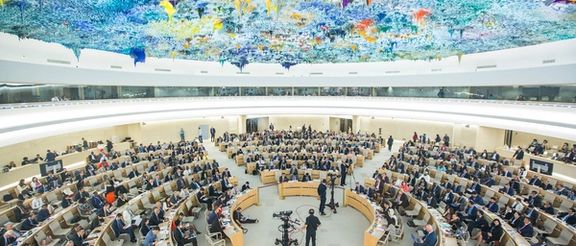
November was a good month for democracy-seeking Iranians who have been on the streets since September, chanting "Woman, Life, Liberty," and "Death to Dictator."
The US government imposed new sanctions on Iranian officials over the protests crackdown sparked by the death of Mahsa Amini, a 22-year-old Kurdish woman in detention after she was fatally beaten in the head for alleged violations of the country’s strict dress code.
The United Nations Human Rights Council held a special session on Iran on 24 November and passed a resolution condemning the deteriorating human rights situation in the Islamic Republic of Iran, the violent crackdown on peaceful protesters, the death of hundreds of people, including scores of children, and the arrests of thousands in connection with the nationwide protests, and voted to establish a Fact-finding Mission to Investigate Alleged Human Rights Violations in Iran Related to the Protests.
On December 14th, there will be an opportunity for the United Nations to undo one of the most grotesque decisions in the history of this world body: appointing the gender-Apartheid Islamic Regime of Iran to the Commission on the Status of Women (CSW).
Since 1946, CSW has been empowering women and promoting gender equality, contrasting with rules, laws, and regulations in Iran's Islamic Regime. The request to hold a vote in the UN's Economic and Social Council came from a resolution led by the US, at the request of Iranian women activists inside and abroad, to oust Iran due to the government crackdown on the women-led protests. But what we’ve seen in the last few weeks is the Islamic Regime of Iran’s (IRI) successful activation of its supporters and apologists in western media, think tanks, and universities to be their propaganda machine against revolution. The IRI and its proxies are engaged in a concerted effort to perpetuate a false narrative about the uprising of Iranian people against their government’s ideology and soften the brutal face of Iran’s regime.
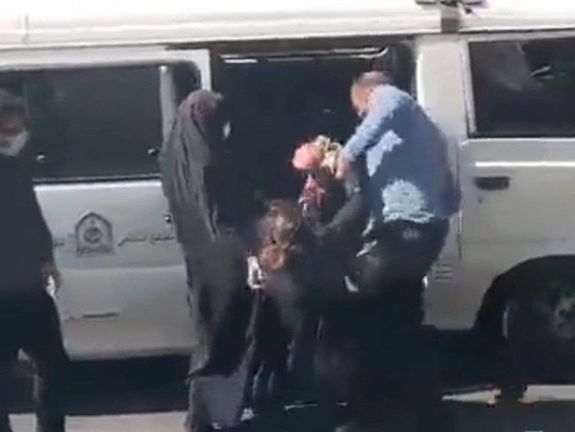
We Iranians living abroad see the competing versions of reality out of Iran, and who gets to choose which reality becomes the narrative, and it’s obvious the some proxies of the regime who have the money and influence are often the ones who decide. For decades, what these so-called experts or pundits said was gaslighting and made us question our account of reality in our experiences by making us question what we know to be the truth.
After years of activists exposing IRI's proxies on social media accounts and revealing the IRI's lobbies, Hossein Ronaghi, a prominent Iranian human rights activist, blogger, and political prisoner, wrote in an Op-ed for the Wall Street Journal, expressing his frustration. "For us, it is as if there are two Irans—the one where we live and another that you read about. Your Iran is defined by a pesky nuclear negotiation. Ours is much worse. It is a religious police state where we live in fear, with countless red lines that most dare not cross. It is a country of repression, censorship, and violence."
A recent New York Times piece shows the propaganda machine in action in regard to Iran’s ‘morality police’ and its future in the country. In response to a reporter's question, IRI's Attorney General said: "The Morality Police has nothing to do with the judiciary, and it was abolished by the same authorities who installed it.” These words prompted reporter Farnaz Fassihi to write an article entitled “Iran Has Abolished Morality Police.” The only problem? It’s not true. On the morning of December 4th, Al-Alam—a channel affiliated with the IRI Broadcasting—denied the possibility of the morality police being shut down and wrote: "Some foreign media have tried to interpret the words of the Attorney General as a retreat by the IRI on the issue of hijab and chastity and affected by the recent riots,” when, according to the IRI, that was not the intended meaning.
For years, Iranians have complained on social media about Fassihi’s reporting and have asked the Times to fix this problem. Iranians even wrote letters to the paper about her “professional infractions”, which include normalizing the Islamic Republic’s brutality through the obfuscation of truth in her journalism over several years.” But our concerns continue to be ignored.
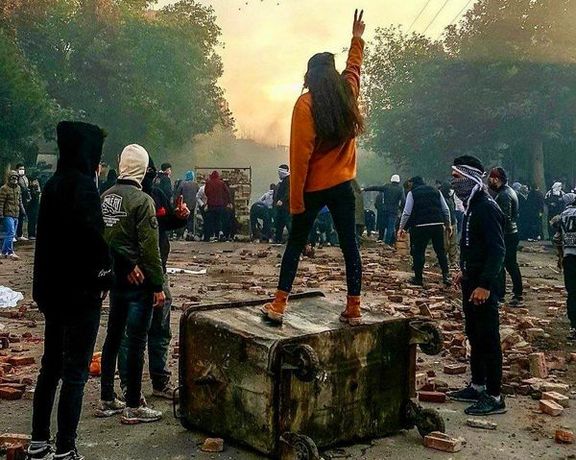
Regardless of whether or not the morality police were actually disbanded, "compulsory hijab" is codified by law in Article 638 of the Islamic Penal Code. It states: "Women who appear without an Islamic hijab in the streets and public will be sentenced to imprisonment from ten days to two months, or a fine of fifty thousand to five hundred thousand Rials." And according to Article eight of the IRI’s Constitution, if someone is not following the Islamic Rules, any citizen can demand that person follow the laws. That’s why we see plain clothes officers or even regular citizens verbally abuse women or even threaten them by calling the police if they don’t wear their compulsory Hijab.
The cruel reality for Iranian women goes far beyond the rules around Hijab. By law, women can’t divorce their husbands, have no child custody rights, receive half inheritance, and can’t leave the country without their husbands' permission. Women also cannot become judges, study certain subjects, play certain sports, enter stadiums, mingle with men, or get elected or appointed into several key positions, including Supreme Leader, President of the Country, President of the Judiciary System, Member of the Guardian Council or Expediency Council, and others. Girls as young as nine can be forced to marry men their father’s pick. Men can legally marry four women and have as many concubines as they wish. Men also can beat their wives. So how can a regime that subjugates women, with so many discriminatory laws, be a member of the Commission on the Status of Women?
Iran is going through a real ‘Renaissance,’ a revolution demanding freedom, democracy, secularism, equality, and justice. Iranians are tired of the restrictions of the gender-apartheid Islamic regime on what they can eat or drink or wear, who they can talk to, and whom they can love. They are tired of the mismanagement of their country's natural resources and nature by clerics and their offspring. A free-democratic Iran means peace and prosperity for the Middle East. Without the Islamic regime, a state sponsor of terrorism, its neighboring countries will be more peaceful, and Iranians will have the freedom and justice they desperately seek. And we need western voices to help get us there.
The opinions expressed by the author are not necessarily the views of Iran International

Tens of Iranian human rights activists have called on the UN Secretary General to react to the execution of 23-year-old protester Mohsen Shekari and the heavy-handed crackdown on protesters.
In an open letter December 10, 45 Iranian activists told António Guterres that only a prompt reaction of the United Nations, democratic governments and influential figures can stop the execution and repression machine of the Islamic Republic of Iran.
Condemning Shekari's execution, the signatories called his trial “horrifying, hasty and extra-judicial” saying it was similar to “Kangaroo and war time court(s).”
Mohsen Shekari, who was convicted of injuring a security guard with a knife and closing off a street in the capital Tehran, was hanged December 8 as the first detained protester to receive the death penalty.
“We, the undersigned…strongly condemn this murder [and] urgently ask your excellency, as the highest authority at this august institution…to use every legal lever to mobilize the international community…to directly and immediately call on the Islamic Republic to cease issuing such sentences,” reads the letter.
Lawyer Nasrin Sotoudeh, Nobel laureate Shirin Ebadi, Mahmoud Amiri Moqqadam, Saeed Dehqan, Parastou Forouhar are among the prominent activists who have signed the letter.
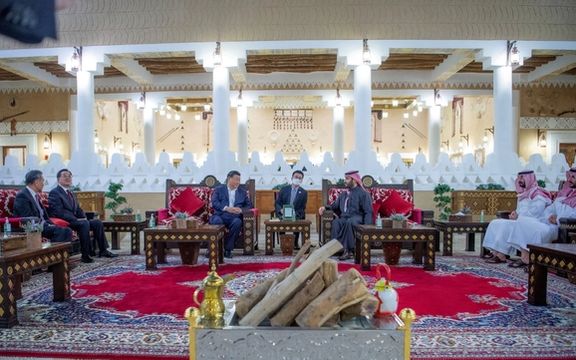
A joint statement at the end of Chinese President Xi Jinping’s visit to Saudi Arabia has led to a strong backlash by Iranians who read it as betrayal by Beijing.
In the statement, the Gulf Cooperation Council and the Chinese side made a reference to three small islands in the Persian Gulf that Iran took over as its historic territory in 1971 but the United Arab Emirates claims as its own.
After Britain withdrew its forces from the region and decided to give independence to the small Arab littoral Sheikdoms, Iran’s Mohammad Reza Shah decided to take over the Greater and Lesser Tunbs and Abu Mousa. The UAE was just being formed and there was a serious political and military vacuum on the Arab side of the Persian Gulf.
Among other things, the concluding statement of the meeting that was attended by GCC dignitaries as well as the visiting Chines President Xi Jinping said: "The leaders affirmed their support for all peaceful efforts, including the initiative and endeavours of the United Arab Emirates to reach a peaceful solution to the issue of the three islands; Greater Tunb, Lesser Tunb, and Abu Musa, through bilateral negotiations in accordance with the rules of international law, and to resolve this issue in accordance with international legitimacy."
The Iranian official news agency did not translate this part of the statement in its report about the GCC meeting, but Iranians on social media were already harshly criticizing their government for a major failure. They asked the clerical rulers, what exactly went wrong that its ally, China acquiesced to such a statement.
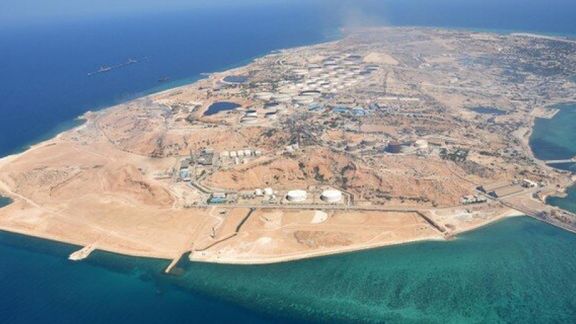
Later on Saturday, Tehran had no choice but to start to react. Iran's Foreign Minister Hossein Amir-Abdollahian wrote in a tweet: "The three Persian Gulf islands are inseparable parts of Iran and are part of the eternal belongings of our motherland. We firmly insist on the need for respecting Iran's territorial integrity." The foreign ministry also invited the Chinese ambassador in Tehran to a meeting and expressed its displeasure about the statement.
The opponents of the Islamic Republic have been arguing for decades that Tehran should establish normal relations with the West and not isolate itself relying on meagre support from China and Russia. Now, these critics found the perfect example to slam the government for putting itself in this latest humiliating position.
Following the issuance of the statement, former Iranian diplomat Abdolreza Faraji Rad told Entekhab news website in Tehran: "It is unlikely that China would be the same for Iran following this statement. I have never imagined before that China would ever take a step against Iran's interests."
Faraji Rad added: "If this trend in China's behavior continues, in less than a decade, China will cause as much as concern for Iran as America does." The former diplomat also said: "It appears that China has given up its 25-year cooperation deal with Iran."
Foreign policy commentator Diako Hosseini tweeted: "Xi Jinping's contribution to the GCC statement about the three islands was an unfriendly behavior against Iran's territorial integrity and against China's claim of not interfering with the internal affairs of other countries. Summoning China's ambassador to the Foreign Ministry and demanding an official apology is the least that should be done."
However, foreign Policy analyst Amir Ali Abolfath tweeted that "warm relations between Saudi Arabia and China will serve Iran's interests if it leads to a reduction in US influence in Saudi Arabia."
Iranian journalist Sadra Mohaqeq wrote: "Iran's official stance about the ownership of the three islands has always been that Iran's ownership of the islands cannot be questioned. Calling on Iran to negotiate about this non-negotiable issue is a direct intervention in Iran's internal affairs and undermines Iran's territorial integrity."
Iranian analyst Ali Hossein Ghazizade wrote in a tweet: "The three Persian Gulf islands have been the subject of the most important security threats against Iran in recent decades. The Chinese, as the Islamic Republic's strategic allies did not stand by Iran. Do people still believe that Iran's territorial integrity will be preserved with such allies?"
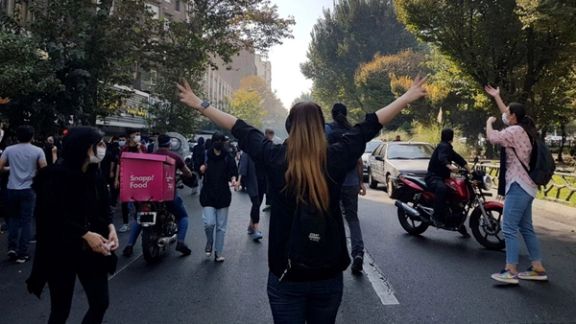
Protests in Iran continued Saturday night with silent rallies against the execution of a protester but they turned ugly after security forces attacked people in the streets.
Many Iranians enraged by the execution of 23-year-old Mohsen Shekari held protests in many cities, starting their rallies in silence but broke into chanting slogans after security forces attacked the crowds.
People in several neighborhoods of the capital Tehran, such as Narmak, Naziabad and Sattarkhan, held rallies and chanted slogans against the regime and the crackdown on protesters. People also chanted slogans in support of Mohsen Shekari, who has become a new codename for protests after Mahsa Amini, the 22-year-old woman whose death ignited the current round of antigovernment protests.
People in several Iranian cities, including Qazvin, Tabriz, Karaj, Roudsar, and Esfahan also held rallies and candlelight vigil for in honor of Shekari. People chanted slogans against his execution, and in support of other protesters who are sentenced to death.
University students on many campuses also held demonstrations in honor of the executed protester, and security forces attacked the gatherings to disperse them. The university of Sanandaj was the scene of clashes between security forces and students.
People from the Iranian diaspora communities also held protests in condemnation of Shekari’s execution in many countries, including Sweden, Germany, Netherlands, Britain, Hungary, Denmark, Japan, Australia, Italy, Turkey, and Belgium.
Iranians in Washington DC also held a gathering in solidarity with protesters in Iran and against the Islamic Republic.
US Republican Senator from Idaho Jim Risch said, "Recent peaceful protests in Iran show the strength of Iranian people in their demands for basic rights like speech, press, religion, assembly and more. The regime’s brutal crackdowns reinforce its status as a pariah state as Iranian people demand change."
Iran’s exiled queen Farah Pahlavi and prince Reza Pahlavi have also expressed sorrow over the execution of Iranian protester Mohsen Shekari asking the people to preserve their unity. "On this Human Rights Day, Iranians seek further international solidarity in support of efforts to save all prisoners of conscience in Iran and secure their immediate and unconditional release," Reza Pahlavi said.

There are reports of fires in military barracks and bases of Basij paramilitary forces across Iran apparently as acts of arson by antigovernment protesters.
There are reports of fires in military barracks and bases of Basij paramilitary forces across Iran apparently as acts of arson by antigovernment protesters.
Videos published on social networks Saturday show a massive fire in one of the major Basij bases in the city of Ahvaz, located in the southwestern province of Khuzestan, called ‘Imam Hussein base’.
The base is one of the main centers to organize security forces and dispatch them to nearby cities to quell the ongoing protests, ignited by the death in custody of Mahsa Amini in mid-September.
There are also reports of similar incidents in several Basij bases in different cities, including a massive fire in the Basij base of Razvanshahr in the northern Gilan province and the burning of a Basij base in the religious city of Mashhad in northeastern Iran.
In the footage of the fire at the Basij base in Mashhad, someone describes the fire as a protest against the execution of Mohsen Shekari, a young protester hanged for injuring a security guard with a knife and closing off a street in the capital Tehran.
Another fire burned down the basij base of Tehran’s Sharif University on Friday night. An official working at the base, Abolfazl Hajizadeh, told reporters that two people entered the university in the middle of the night and set the base on fire with two bottles containing an inflammable substance.
Setting fire to basij bases, where repression agents are normally stationed, and the seminaries of cities and state buildings have become a recurring phenomenon during the past three months. Mosques and basij bases in several cities such as Gorgan, Orumiyeh (Urmia), Kazerun, and Zanjan were set on fire by the protesters since the current wave of protests began.
In November, the ancestral home of the Islamic Republic’s founder Ruhollah Khomeini in the city of Khomein in the western Markazi province was also set ablaze with crowds of jubilant protesters marching past.
The execution of Mohsen Shekari, as the first protester who was hanged, has fueled more protests in Iran and led to worldwide condemnations by governments and public personalities. The United States, Canada, Australia, and the European Union imposed additional sanctions or are considering punitive measures against the Islamic Republic. Many people have described Mohsen Shekari as the most significant name in the revolt against the regime, second only to Mahsa Amini.
Most Iranians and foreign officials have described his execution as a futile attempt by the Islamic Republic to intimidate the people not to participate in further protests, but the propaganda stunt seems to have backfired as it has made people more determined. Many Iranians say they are now certain that if they stop the protests and strikes, more people will be killed by the regime.